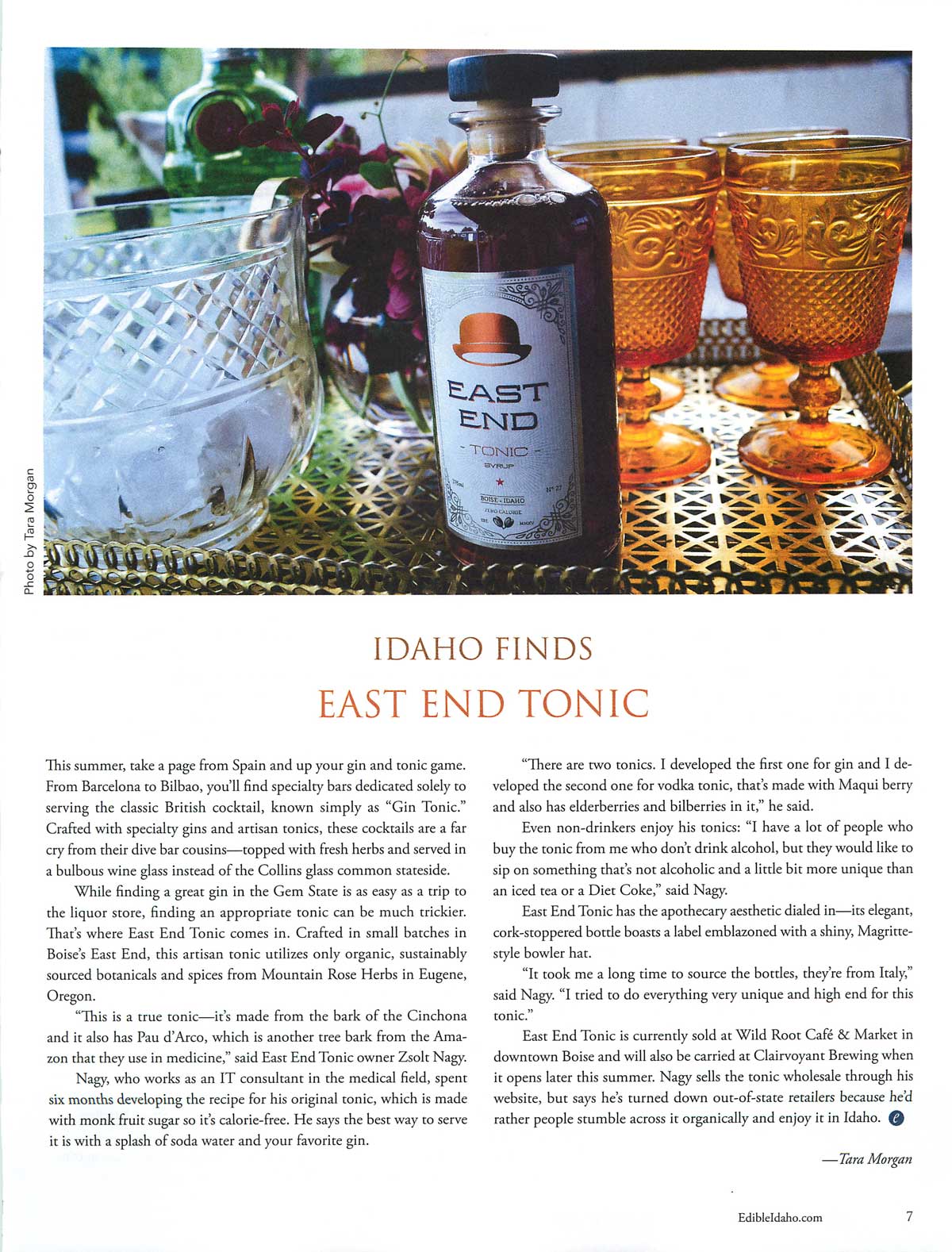“Best Zero Calorie Tonic: East End Tonic” - Bets of the GIN is IN, 2019 Award Winner
…Tasting Note
The nose is sweet smelling, with a rose and cherry wood aroma. In fact, it has a nose similar to other tonic syrups. Bold with a spicy under current— East End Tonic is quite inviting just as a syrup right from the bottle.
On its own, it’s surprisingly and mildly sweet early. For fans of cane sugar— you can tell this is a non-traditional sweetener. But for people who are skeptical or downright not into no/low-calorie sweeteners, East End Tonic tastes surprisingly not at all like those…
…Overall, East End Tonic
Certainly East End Tonic is one of the most unusual tonic syrups I’ve reviewing in recent years. If you’re watching your blood sugar or prefer to imbibe with a zero calorie tonic water— I think this is the best option out there. I vastly prefer East End Tonic Syrup’s use of Monk Fruit to other artificial sweeteners.
Most importantly, as a cocktail. It stands on its own. I would prefer more bitterness in my tonic. And although I prefer real sugar in my drinks, I have to give serious props and respect to what they’ve done here.
Highly Recommended in its category…
East End Citrom Tonic…With a bold vision: “We made this Tonic to be the ‘all-around’ Tonic to go with any type of spirit or cocktail recipe that calls for simple syrup and citrus.”
With a bold vision: “We made this Tonic to be the ‘all-around’ Tonic to go with any type of spirit or cocktail recipe that calls for simple syrup and citrus.” Boise, Idaho’s East End Tonic’s Citrom Tonic (the ‘m’ is not a typo) is the more citrus-forward among their line of tonic syrups. Similar to their maqui berry tonic, Citrom tonic is sweetened with sugar.
Unlike the other two, it doesn’t use more than one bark. Citrom Tonic is only cinchona bark. In addition to that, it features kola nuts and lemon oil in addition to spices.
In Hungarian, Citrom means lemon, simply enough.
Tasting Notes
Citrom tonic has an intense, vivid amber color from the bottle. Nosed, there’s a bit more wood than in the other East End Tonic syrups. It’s almost got a spicy A1 BBQ sauce nose. It’s a touch smoky, woody, and sweet with heavy molasses notes. It’s a bit unusual— I wouldn’t have guessed lemon or any sort of citrus for that matter.
The palate is moderately sweet early with a mid-palate lemon and orange zest hit. It becomes slightly more woody towards the finish which at first is slightly cloying with hints of lemon gumdrop and a touch of quinine. Then it becomes a bit more cola-like with citrus, nutmeg, and cinnamon create a note suggestive more of a Q cola than of a Pepsi or Coke. Overall, on its own, although quite sweet, it has a nice flavor profile
…
East End Maqui Berry Tonic. The Boise, Idaho based East End Tonic are no strangers to unusual ingredients in their tonic water… - GIN is IN
The Boise, Idaho based East End Tonic are no strangers to unusual ingredients in their tonic water. For example, their flagship tonic syrup is sweetened with Monk Fruit and features the bark of the Pau D’arco tree. Their Maqui Berry Tonic is no different.
Maqui Berry is a strong antioxidant and is one of many “superfruits.” These small dark colored berries were a part of the native peoples of what is now Chile’s medicine. They’ve now entered our modern day natural-healing culture as a potential helper for everything from your heart’s health to dry eyes.
Chris Killiam upon trying the berries in 2011 wrote, “One thing I discovered is that maqui berries taste delicious. They are sweet, bursting with flavor, and something I would be happy to eat every day.” Emilia Benton wrote for PopSugar, “Maqui berries offer up a tart flavor similar to blackberries and cherries.” Before East End Maqui Berry Tonic, I’ve never had them.
In addition to maqui berry, East End Maqui Berry Tonic features elderberry, bilberry, lemon oil, orange oil, spices and is sweetened with sugar.
…





